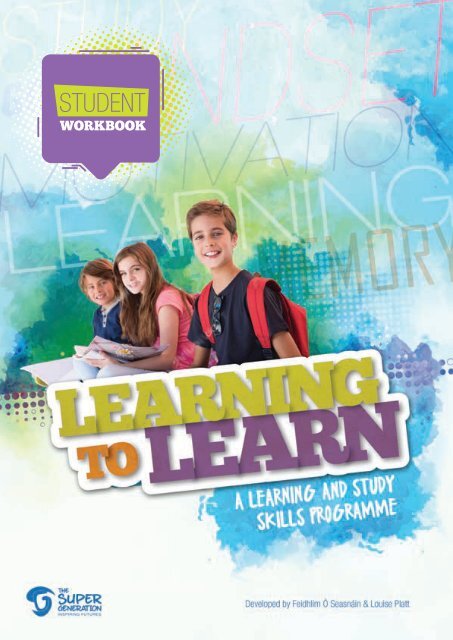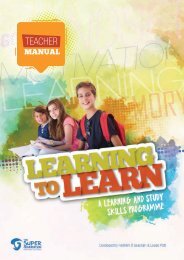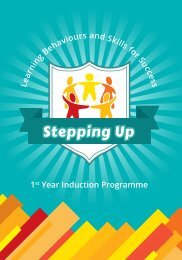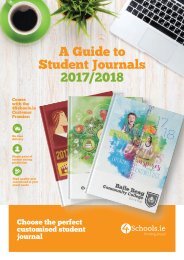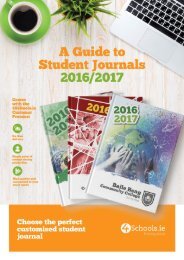Learning to Learn - Student Workbook - Chapter 1
We know that the sooner you can settle into your learning and study, the sooner you begin to make progress in your studies and achieve the grades you wish for.
We know that the sooner you can settle into your learning and study, the sooner you begin to make progress in your studies and achieve the grades you wish for.
- No tags were found...
Create successful ePaper yourself
Turn your PDF publications into a flip-book with our unique Google optimized e-Paper software.
workbook
Published by<br />
The Super Generation<br />
35 Finglas Business Park, Tolka Valley Road, Finglas, Dublin 11, D11 YF40<br />
© 2017 The Super Generation<br />
All rights reserved. No part of this publication may be<br />
reproduced or transmitted in any form or by any means,<br />
including pho<strong>to</strong>copying and recording, without written<br />
permission of the publisher. Such written permission must also<br />
be obtained before any part of this publication is s<strong>to</strong>red in<br />
a retrieval system of any nature. Requests for permission should be<br />
directed <strong>to</strong> The Super Generation, 35<br />
Finglas Business Park, Tolka Valley Road, Finglas,<br />
Dublin 11 D11 YF40 or info@thesupergeneration.com<br />
The Super Generation has attempted <strong>to</strong> contact all proprie<strong>to</strong>rs<br />
of images, texts and graphics included on this site.<br />
Proprie<strong>to</strong>rs we could not reach are requested <strong>to</strong> contact us.
14
Section 1 : Introduction<br />
Transitioning and<br />
Section 1:<br />
Settling in<strong>to</strong> Study<br />
We know that the sooner you can settle in<strong>to</strong> your learning and<br />
study, the sooner you begin <strong>to</strong> make progress in your studies and<br />
achieve the grades you wish for.<br />
The focus for this section is <strong>to</strong><br />
assist you the student in settling<br />
in<strong>to</strong> your learning and study as<br />
quickly and efficiently as possible.<br />
This section may be broken up in<strong>to</strong><br />
the following areas:<br />
<strong>Chapter</strong>s 1 and 2 look at the<br />
key skills that will help you<br />
settle in and adjust <strong>to</strong> your<br />
new learning environment and<br />
also introduce you <strong>to</strong> the key<br />
skills you will be developing for<br />
the Junior Cycle.<br />
<strong>Chapter</strong>s 3 and 4 explore<br />
your new subjects bothfor<br />
class and for doing homework.<br />
Finally, <strong>Chapter</strong> 10 will<br />
introduce you <strong>to</strong> some simple<br />
memory techniques which<br />
you can use in your study<br />
and revision.<br />
There is an End of section<br />
reflection for you <strong>to</strong> reflect<br />
on what it is you have<br />
personally learned from<br />
this section and how it can<br />
improve your learning and<br />
study going forward.<br />
You will be given the opportunity<br />
<strong>to</strong> practise all these new skills<br />
with some of the subjects you<br />
will be doing for the Junior Cycle.<br />
<strong>Chapter</strong> 5 looks at how your<br />
brain works and how you can<br />
improve your learning.<br />
<strong>Chapter</strong>s 6 <strong>to</strong> 9 share with<br />
you strategies for managing<br />
all the new information you<br />
will be engaging with. You will<br />
explore strategies <strong>to</strong> aid you<br />
in your thinking, note taking,<br />
reading and writing.<br />
15
Section 1:<br />
<strong>Chapter</strong><br />
1 Settling in<strong>to</strong> Secondary school<br />
Lesson 1: My Timetable<br />
Lesson 2: Being Organised<br />
Lesson 3: Filling in my Homework Journal<br />
2 Behaviours for <strong><strong>Learn</strong>ing</strong><br />
<strong>Chapter</strong><br />
Lesson 4: Behaviours for <strong><strong>Learn</strong>ing</strong> 1<br />
Lesson 5: Skills and Attitudes<br />
Lesson 6: Behaviour for <strong><strong>Learn</strong>ing</strong> 2<br />
Lesson 7: Key Skills for Junior Cycle<br />
3 My Subjects<br />
<strong>Chapter</strong><br />
Lesson 8: What are my Subjects?<br />
Lesson 9: Subjects and Topics<br />
Lesson 10: Topics and Keywords<br />
4 What is Homework?<br />
<strong>Chapter</strong><br />
Lesson 11: The Purpose of Homework<br />
Lesson 12: Types of Homework<br />
Lesson 13: Completing Homework Assignments<br />
5 My Brain and <strong><strong>Learn</strong>ing</strong><br />
<strong>Chapter</strong><br />
Lesson 14: Growing my Brain<br />
Lesson 15: Improving our <strong><strong>Learn</strong>ing</strong><br />
Lesson 16: Paired and Group <strong><strong>Learn</strong>ing</strong>
6 Managing Information and Thinking<br />
<strong>Chapter</strong><br />
Section 1:<br />
Lesson 17: Developing Curiosity<br />
Lesson 18: Command Words 1<br />
Lesson 19: Command Words 2<br />
7 Managing Information and Note Taking<br />
<strong>Chapter</strong><br />
Lesson 20: Writing Frames<br />
Lesson 21: Visual Notes<br />
8 Managing Information and Reading<br />
<strong>Chapter</strong><br />
Lesson 22: Active Reading 1<br />
Lesson 23: Active Reading 2 – T2M2C Model<br />
Lesson 24: Active Reading 3 – T2M2C Model<br />
9 Managing Information and Listening<br />
<strong>Chapter</strong><br />
Lesson 25: Skills for <strong><strong>Learn</strong>ing</strong> – Listening 1<br />
Lesson 26: Skills for <strong><strong>Learn</strong>ing</strong> – Listening 2<br />
10 Memory Techniques<br />
<strong>Chapter</strong><br />
Lesson 27: Memory Techniques 1<br />
Lesson 28: Memory Techniques 2
<strong>Chapter</strong> 1<br />
Lesson 1<br />
My Timetable<br />
Aim<br />
To learn how <strong>to</strong> effectively use<br />
my school timetable<br />
<strong><strong>Learn</strong>ing</strong> Point 1<br />
My own timetable<br />
The school day can appear quite busy and confusing initially, trying <strong>to</strong> figure<br />
out where you are supposed <strong>to</strong> be and when. With all these new subjects, in<br />
different classrooms with different teachers, it can be quite confusing. Most<br />
schools hand out timetables <strong>to</strong> students with abbreviations of the subject<br />
and teachers’ initials simply <strong>to</strong> fit everything in; maybe you might need help in<br />
decoding all these new abbreviations.<br />
exercise1<br />
The words in the first<br />
column are the subjects<br />
you might be studying.<br />
Do you know what the<br />
initials are for all your<br />
subjects?<br />
Try and fill in the following grid<br />
with the initials of each subject,<br />
the room number /name and the<br />
teacher’s name/ abbreviation. There are<br />
spaces at the end <strong>to</strong> add any subject<br />
which might not be included here.<br />
Subject Initials Room Teacher<br />
Metalwork<br />
Science<br />
French<br />
His<strong>to</strong>ry<br />
Business Studies<br />
German<br />
26
Subject Initials Room Teacher<br />
Geography<br />
Technical<br />
Drawing<br />
Social Personal and<br />
Health Education<br />
Religion<br />
Civic, Social and<br />
Political Education<br />
Maths<br />
Metalwork<br />
Gaeilge (Irish)<br />
Spanish<br />
Home Economics<br />
Technology<br />
Physical Education<br />
27
exercise2<br />
Deciphering your timetable<br />
This is a sample timetable with the subjects, locations and times<br />
of each class. Study this timetable and see if you can answer the<br />
questions that follow.<br />
School timetable<br />
Time mon tue wed thu fri<br />
9.00-9.40 Eng R1 Gae R14 Hi R3 Metal MR PE Gym<br />
9.40-10.20 Sci Lab3 RE R11 Sci Lab3 Metal MR Art Art R.<br />
10.20-10.55 His R6 Mat R3 Mat R3 Geo R10 Mat R3<br />
10.55-11.10 Break<br />
11.10-11.50 Gae R14 En R1 Bus R5 Gae R14 RE R11<br />
11.50-12.25 Mus Music R Fren R7 Eng R1 Eng R1 His R3<br />
12.25-13.05 SPHE R20 PE Gym CSPE R2 Mat R3 Fren R7<br />
13.05-13.45 Lunch<br />
13.45-14.25 Mat R3 Bus R5 Fren R7 Art Art R. Eng R1<br />
14.25-15.05 Fren R7 Art Art R. Gae R14 Bus R5 Geo R10<br />
15.05-15.45 Geo R10 His R3 RE R11 Sci Lab3 Gae R14<br />
1. How often does this student have religion in the week?<br />
2. In what room is the science class held?<br />
3. How many periods of English does this student have?<br />
4. What class has this student got at 12.25 on Friday?<br />
5. Where is this student supposed <strong>to</strong> be on Wednesday at 14.25?<br />
28
Subject Initials Room<br />
Geography<br />
<strong><strong>Learn</strong>ing</strong> Point 2<br />
My own timetable<br />
How familiar are you already with your own timetable?<br />
Technical<br />
Drawing<br />
social Personal and<br />
Health education<br />
Religion<br />
3<br />
exercise<br />
Cover your timetable and do not look at it for<br />
the answers. Try and answer as many of the<br />
following questions as possible, how many did<br />
you get right?<br />
1. School begins at what time?<br />
2. How many classes do you have each day?<br />
3. How long is each class?<br />
Civic, social and<br />
Political education<br />
Maths<br />
Metalwork<br />
Gaeilge (Irish)<br />
spanish<br />
Home economics<br />
Technology<br />
Physical education<br />
4. How many times a week do you have English?<br />
5. How many classes are there between the break time and lunchtime?<br />
6. Lunchtime begins at what time and finishes at what time?<br />
7. How many classes of SPHE do you have each week?<br />
8. What classroom do you have geography in?<br />
9. How many classes a week do you have?<br />
10. School finishes at what time?<br />
11. What class do you have after lunch on a Wednesday?<br />
12. What is your last class of the week?<br />
29
4<br />
exercise<br />
As a quick recap and summary of the lesson, fill in the<br />
following summary table of the timetable and subjects.<br />
Subject What is the<br />
Subject?<br />
Ir<br />
Number<br />
of Classes<br />
Who is<br />
my Teacher?<br />
Eng<br />
Maths<br />
Sci<br />
Bus<br />
Hist<br />
Geog<br />
Wk<br />
Met<br />
RE<br />
CSPE<br />
SPHE<br />
TG<br />
Music<br />
Art<br />
30
Do you have a favourite subject yet?<br />
Why?<br />
What new subject are you looking forward <strong>to</strong> finding out more about?<br />
Why?<br />
Pause and Reflect<br />
1. What have you learned in this lesson?<br />
2. How did you learn this?<br />
3. How can you use what you learned in your schoolwork/study?<br />
Mental Note<br />
Develop a passion for learning. If you do you<br />
“<br />
will never cease <strong>to</strong> grow. – Anthony D. J’Angelo<br />
”<br />
31
Schools should provide a space for “learning opportunities designed <strong>to</strong><br />
develop self-management and personal organisation skills including goal<br />
setting, study skills, coping skills and reflection skills.”<br />
- NCCA guidelines on Well-Being for The Junior Cycle<br />
The <strong><strong>Learn</strong>ing</strong> <strong>to</strong> <strong>Learn</strong> workbook provides a structured course for Junior<br />
Cycle students, equipping them with the essential skills <strong>to</strong> be successful in their<br />
academic life. The programme assists students in understanding themselves<br />
better, being more organised and confident as learners along with having a<br />
proven study system and assessment approach which will reduce their stress<br />
level and add <strong>to</strong> their sense of well-being.<br />
There is a key focus for each section accompanying students through the Junior Cycle.<br />
Section 1 – Transition and Study, supports students <strong>to</strong> quickly adapt <strong>to</strong><br />
the new expectations placed upon them in their learning.<br />
Section 2 - Goal Setting and Study, provides students with the<br />
motivation and skills <strong>to</strong> become effective at learning and studying.<br />
Section 3 - Study and assessment preparation, aids students in working<br />
<strong>to</strong>wards success in their learning.<br />
Section 4 - Study Journal assist students in planning and recording their<br />
study and revision.<br />
Each <strong>Chapter</strong> has key learning points with practical exercises taken from a<br />
variety of subjects being studied by students during the Junior Cycle, along with<br />
a reflective opportunity at the end of the lesson where the students reflect<br />
on and record where they intend <strong>to</strong> implement what they learned in<strong>to</strong> their<br />
regular study.<br />
”It is full of ideas, methods and techniques that will help busy teachers planning<br />
their course work if they wish <strong>to</strong> launch a short course in “How We <strong>Learn</strong>”. It’s a<br />
practical book and in my view an essential workbook for all students and an ideal<br />
book for teaching learning for their teacher, tu<strong>to</strong>r and year head.“<br />
- Patrica Atkins, Former Principal<br />
<strong><strong>Learn</strong>ing</strong> <strong>to</strong> <strong>Learn</strong> The Super Generation<br />
35 Finglas Business Park, Tolka Valley Road, Finglas, Dublin 11 D11 YF40<br />
T: 01 808 1494 - F: 01 836 2739 - E: info@thesupergeneration.com


